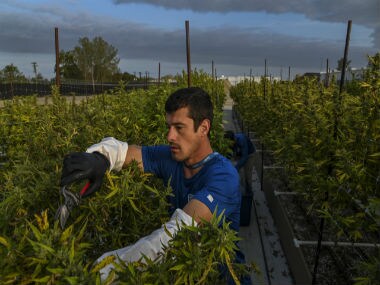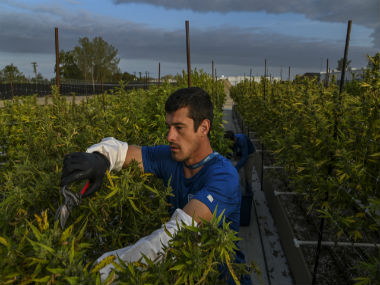On Monday, England and Wales approved the use of two cannabis-based drugs to treat severe forms of epilepsy and multiple sclerosis (MS) - both conditions affect the central nervous system including the brain. This announcement comes at a time when governments around the world are beginning to concede the therapeutic value of Cannabis sativa, also known as marijuana, grass, weed, and pot: in Germany, 16,000 patients received cannabis-related treatment last year; two-thirds of them were reimbursed by the country’s largest insurer. Thirty-three US states have legalized medical marijuana. The World Health Organization also suggested lifting the strict restrictions around cannabis products so its therapeutic properties can be better understood through research. And closer to home, Ayurveda experts are pitching for the legalisation of cannabis for medicinal use. [caption id=“attachment_7657331” align=“alignleft” width=“380”]  Representational image. Image source: Getty Images.[/caption]
What are cannabis-based drugs?
Cannabinoids are a group of compounds found in the Cannabis sativa plant. They are chemically very similar to molecules in our own body called endocannabinoids - this allows the cannabinoids to interact with our cannabinoid receptors. The endocannabinoid system performs a variety of functions: they are involved in regulating pain, mood, appetite, stress, and sleep. As many as 144 different compounds of cannabinoids have been discovered so far but the most widely studied ones are tetrahydrocannabinol (THC) and cannabidiol (CBD). THC has got a lot of bad press recently since it is psychoactive - it is responsible for the “high” caused by consuming cannabis. CBD, on the other hand, has some therapeutic effects without the high.
What do the studies say?
While the academic and mainstream attention to cannabis therapy is welcome, given the impressive outcomes for epilepsy and MS, there is a risk of overstating the benefits and uses of it. Not enough randomized, double-blind trials have been conducted to assess causality between the drugs and post-traumatic stress disorder (PTSD), depression and sleep-related issues. A recent population-based, cross-sectional analysis of PTSD victims suggested that those who had taken cannabis in the previous year reported fewer suicidal and depressive thoughts. Another double-blind study, however, found little to no change in the emotional reactions of participants who were given cannabis and then shown disturbing images. To be sure, some patients with sleep-related issues and depression report easing of symptoms, and many self-administer the drug. However, researchers have yet to confirm this through human trials and double-blind randomized studies - it has been difficult to do these till now because marijuana is still illegal in many countries and hard to come by in large enough quantities for research. Having said that, studies have demonstrated effectiveness in controlling chemo-induced nausea and chronic pain in adults.
What are the side effects?
Studies have shown that dependency can arise among heavy users. Those who try to quit may experience withdrawal symptoms such as irritability, and trouble sleeping and focusing. High concentration strains over long periods can also lead to psychosis. Concerningly, given the high prevalence of casual smoking in teens, impaired brain development has been shown to occur amongst adolescents. Overdosing on cannabis is unlikely to happen.
What lies ahead?
CBD oil and products made with it are freely available in some countries. Some of these products make grand claims of solving health problems from chronic pain to insomnia. While these grandiose claims of cannabis-infused products can be a bit misleading, the UK’s approval of the two drugs on Monday is encouraging. It underscores the fact that given more research into its properties, more cannabis-based drugs could come into the mainstream soon. India has not yet approved any cannabis-based drugs, but trials are underway. Perhaps in a couple of years, we might see some medical marijuana in our country, too. Health articles in Firstpost are written by myUpchar.com, India’s first and biggest resource for verified medical information. At myUpchar, researchers and journalists work with doctors to bring you information on all things health. For more information, please read our article on Post Traumatic Stress Disorder_._


)

)
)
)
)
)
)
)
)



